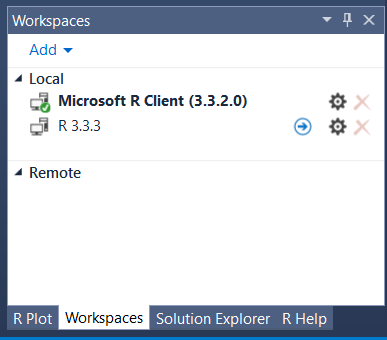RStudio Workbench. Take control of your R and Python code. An integrated development environment for R and Python, with a console, syntax-highlighting editor that supports direct code execution, and tools for plotting, history, debugging and workspace management. R and ArcGIS work together to solve scientific problems. Combine the power of ArcGIS and R to solve your spatial problems. The R – ArcGIS Community is a community driven collection of free, open source projects making it easier and faster for R users to work with ArcGIS data, and ArcGIS users to leverage the analysis capabilities of R.
RStudio is a set of integrated tools designed to help you be more productive with R. It includes a console, syntax-highlighting editor that supports direct code execution, and a variety of robust tools for plotting, viewing history, debugging and managing your workspace. I love R&R I've bought everything they are tools tarps trailer hitches trailer wheels coloring books random stuff its so fun socks shoes boots and more random stuff it's fun to rifle through all that they have the place is huge inside. The trailer hitch that I bought was $30 cheaper than Tractor Supply outlet really good prices.
The aim of devtools is to make your life as a package developer easier by providing R functions that simplify many common tasks. R packages are actually really simple, and with the right tools it should be easier to use the package structure than not. Package development in R can feel intimidating, but devtools does every thing it can to make it as welcoming as possible. devtools comes with a small guarantee: if because of a bug in devtools a member of R-core gets angry with you, I will send you a handwritten apology note. Just forward me the email and your address, and I'll get a card in the mail.
devtools is opinionated about how to do package development, and requires that you use roxygen2 for documentation and testthat for testing. Not everyone agrees with these opinions, and they are by no means perfect, but they have evolved during the process of writing over 30 R packages. I'm always happy to hear about what doesn't work for you, and any places where devtools gets in your way. Either send an email to the rdevtools mailing list or file an issue.
Updating to the latest version of devtools
You can track (and contribute to) development of devtools at https://github.com/hadley/devtools. To install it:
R-tools R-drive Image
Install the release version of
devtoolsfrom CRAN withinstall.packages('devtools').- Make sure you have a working development environment.
- Windows: Install Rtools.
- Mac: Install Xcode from the Mac App Store.
- Linux: Install a compiler and various development libraries (details vary across differnet flavors of Linux).
Follow the instructions below depending on platform.
Mac and Linux:
Windows:
Package development tools
All devtools functions accept a path as an argument, e.g. load_all('path/to/path/mypkg'). If you don't specify a path, devtools will look in the current working directory - this is recommend practice.
R Tools 4
Frequent development tasks:
load_all()simulates installing and reloading your package, loading R code inR/, compiled shared objects insrc/and data files indata/. During development you usually want to access all functions soload_all()ignores the packageNAMESPACE.load_all()will automatically create aDESCRIPTIONif needed.document()updates documentation, file collation andNAMESPACE.test()reloads your code, then runs alltestthattests.
Building and installing:
install()reinstalls the package, detaches the currently loaded version then reloads the new version withlibrary(). Reloading a package is not guaranteed to work: see the documentation tounload()for caveats.build()builds a package file from package sources. You can can use it to build a binary version of your package.install_github()installs an R package from github,install_gitorious()from gitorious,install_bitbucket()from bitbucket,install_url()from an arbitrary url andinstall_file()from a local file on disk.install_version()installs a specified version from cran.
Check and release:
check()updates the documentation, then builds and checks the package.build_win()builds a package using win-builder, allowing you to easily check your package on windows.run_examples()will run all examples to make sure they work. This is useful because example checking is the last step ofR CMD check.check_doc()runs most of the documentation checking components ofR CMD checkrelease()makes sure everything is ok with your package (including asking you a number of questions), then builds and uploads to CRAN. It also drafts an email to let the CRAN maintainers know that you've uploaded a new package.
Other commands:
bash()opens a bash shell in your package directory so you can use git or other command line tools.wd()changes the working directory to a path relative to the package root.
Development mode
Calling dev_mode() will switch your version of R into 'development mode'. In this mode, R will install packages to ~/R-dev. This is useful to avoid clobbering the existing versions of CRAN packages that you need for other tasks. Calling dev_mode() again will turn development mode off, and return you to your default library setup.

Other tips
I recommend adding the following code to your .Rprofile:
See the complete list in ?devtools
This will set up R to:

- always install packages from the RStudio CRAN mirror
- ignore newlines when
browse()ing - give minimal output from
traceback() - automatically load
devtoolsin interactive sessions
There are also a number of options you might want to set (in .Rprofile) to customise the default behaviour when creating packages and drafting emails:
devtools.name: your name, used to sign emailsdevtools.desc.author: your R author string, in the form of'Hadley Wickham <h.wickham@gmail.com> [aut, cre]'. Used when creating defaultDESCRIPTIONfiles.devtools.desc.license: a default license used when creating new packages
A free version of R-Wipe & Clean that can clean most essential traces. R-Wipe & Clean trial version will turn R-Wipe & Clean Lite upon ending the trial period.
| Feature | R-Wipe & Clean Lite | R-Wipe & Clean Full |
| Cleaning of most important system and personal traces | YES | YES |
| Removal of unnecessary data to free disk space | YES | YES |
| Detailed content view of all discovered traces | YES | YES |
| Wipe lists: lists of traces and files to be cleaned through one clean and wipe task | YES | YES |
| R-Wipe & Clean Smart: an advanced tool to create complex wipe lists | YES | YES |
| Disk free space wiping, including wiping MFT on NTFS disks | YES | YES |
| System integration: Most wipe and clean operations can be performed directly from Windows | YES | YES |
| Cleaning of any detectable traces | NO | YES |
| Cleaning all selected traces through one single action | NO | YES |
| Traces Selection Helper: A tool to help you select the traces that you should really clean. | NO | YES |
| Tasks: Cleaning actions that combined in a single task to be run manually or scheduled. | NO | YES |
| Locked files cleaning: traces stored in system locked files can be cleaned during system startup/restart | NO | YES |
| Customization: All items you never want to clean can be hidden | NO | YES |
| Touch interface: a very convenient interface for touch screens (tablets, small laptops, and alike) | NO | YES |